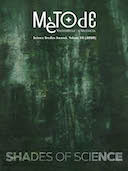Manufactured life: The scientific and social challenges of synthetic biology
DOI:
https://doi.org/10.7203/metode.10.13229Keywords:
biotechnology, metaphor, artificial life, synthetic life, scientific communication Abstract
Abstract
Since biology became secularised and the molecular scrutiny of life began, the possibility of artificially synthesising living cells in a laboratory became a tangible possibility. Contemporary synthetic biology aspires to design and manufacture new forms of life to obtain social and economic benefits. However, we cannot rule out the possibility that the creation of synthetic life forms may also bring scientific rewards in terms of a greater understanding of biological complexity, which we would not be able to access through analytical means. It is clear, therefore, that the term synthetic biology raises expectations, but it is no less true that it also causes concern. This article starts with a critique of the identification of cells as machines and discusses the current scope of synthetic biology and efforts to standardise it. We also outline some of the social implications of attempts to manufacture life.
 Downloads
Downloads
 References
References
Creager, A. N. H. (2002). The life of a virus. Tobacco mosaic virus as an experimental model, 1930-1965. Chicago: The University of Chicago Press.
De Lorenzo, V. (2011). Beware of metaphors: Chasses and orthogonality in synthetic biology. Bioengineered Bugs, 2(1), 3–7. doi: 10.4161/bbug.2.1.13388
De Lorenzo, V. (2018). Evolutionary tinkering vs. rational engineering in the times of synthetic biology. Life Sciences, Society and Policy, 14(1), 18. doi: 10.1186/s40504-018-0086-x
Douglas, T., Powell, R., & Savulescu, J. (2013). Is the creation of artificial life morally significant? Studies in History and Philosophy of Biological and Biomedical Sciences, 44, 688–696. doi: 10.1016/j.shpsc.2013.05.016
Keller, E. (2002). Making sense of life. Explaining biological development with models, metaphors, and machines. Cambridge: Harvard University Press.
Konig, H., Dorado-Morales, P., & Porcar, M. (2015). Responsibility and intellectual property in synthetic biology: A proposal for using Responsible Research and Innovation as a basic framework for intellectual property decisions in synthetic biology. EMBO Reports, 16(9), 1055–1059. doi: 10.15252/embr.201541048
Leduc, S. (1912). La biologie synthétique. Paris: A. Poinat.
Loeb, J. (1904). The recent development of biology. Science, 20(519), 777–786. doi: 10.1126/science.20.519.777
Loeb, J. (1906). The dynamics of living matter. New York: Columbia University Press.
Nicholson, D. J. (2014). The machine conception of the organism in development and evolution: A critical analysis. Studies in History and Philosophy of Biological and Biomedical Sciences, 48, 162–174. doi: 10.1016/j.shpsc.2014.08.003
Peretó, J. (2016). Erasing borders: A brief chronicle of early synthetic biology. Journal of Molecular Evolution, 83(5–6), 176–183. doi: 10.1007/s00239-016-9774-4
Peretó, J., & Català, J. (2012). Darwinism and the origin of life. Evolution: Education and Outreach, 5(3), 337–341. doi: 10.1007/s12052-012-0442-x
Porcar, M., & Peretó, J. (2016). Nature versus design: Synthetic biology or how to build a biological non-machine. Integrative Biology: Quantitative Biosciences from Nano to Macro, 8(4), 451–455. doi: 10.1039/c5ib00239g
Porcar, M., & Peretó, J. (2018). Creating life and the media: Translations and echoes. Life Sciences, Society and Policy, 14(1), 19. doi: 10.1186/s40504-018-0087-9
Tawfik, D. S. (2010). Messy biology and the origins of evolutionary innovations. Nature Chemical Biology, 6(10), 692–696. doi: 10.1038/nchembio.441
Turney, J. (1995). Life in the laboratory: Public responses to experimental biology. Public Understanding of Science, 4(2), 153–176. doi: 10.1088/0963-6625/4/2/004
Valverde, S., Porcar, M., Peretó, J., & Solé, R. V. (2016). The software crisis of synthetic biology. BioRxiv. doi: 10.1101/041640
Downloads
Published
How to Cite
-
Abstract2032
-
PDF777
Issue
Section
License
All the documents in the OJS platform are open access and property of their respective authors.
Authors publishing in the journal agree to the following terms:
- Authors keep the rights and guarantee Metode Science Studies Journal the right to be the first publication of the document, licensed under a Creative Commons Attribution-NonCommercial-NoDerivatives 4.0 International License that allows others to share the work with an acknowledgement of authorship and publication in the journal.
- Authors are allowed and encouraged to spread their work through electronic means using personal or institutional websites (institutional open archives, personal websites or professional and academic networks profiles) once the text has been published.





